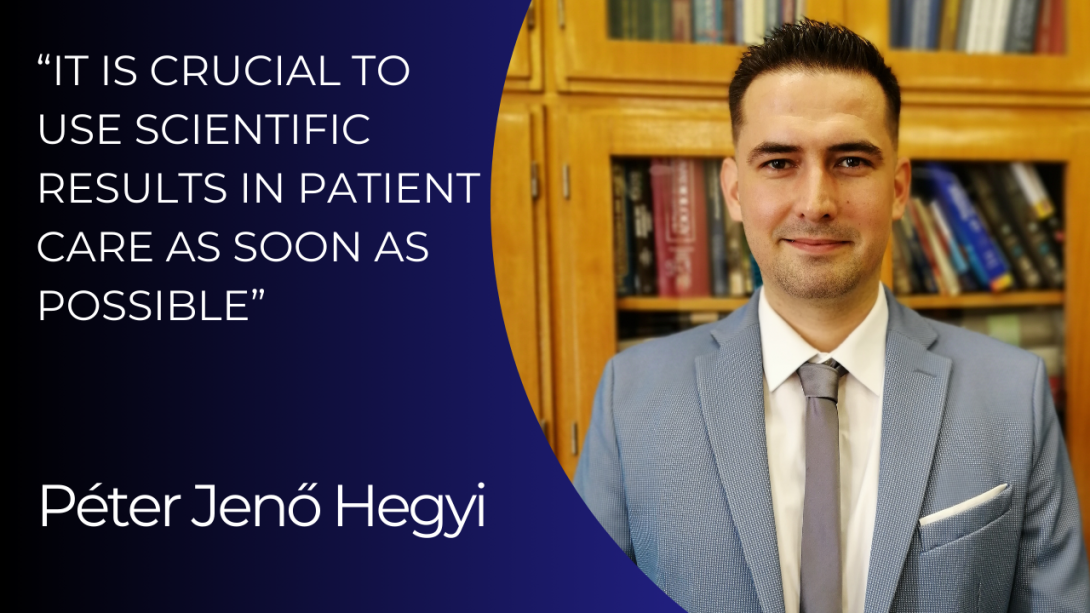
Dr. Péter Jenő Hegyi joined the Translational Medicine Institute in Pécs seven years ago, and when the centre moved to Budapest, he also started assisting the Centre for Translational Medicine. He emphasizes the importance of evidence-based medicine, and would like to encourage physicians to base their work on research rather than outdated medical practices. In March, he was named Supervisor of the Month (Year 2-3) at the Centre for Translational Medicine.
Dr. Peter Jenő Hegyi joined the Institute for Translational Medicine in Pécs in 2017, thanks to a chance encounter, and later he moved to Semmelweis University with the centre. “I was born in Upper Hungary and graduated from the Slovak Medical University at Bratislava. I worked at the university hospital, dealing with Crohn's disease and ulcerative colitis. We treated these inflammatory bowel diseases with biological therapy, and I was sent to London for further training in this field. I’ve encountered the colleagues of Professor Péter Hegyi there. We first met when he delivered a talk on translational medicine at Comenius University. He suggested that I should spend a year of my residency training at the University of Pécs. I was very interested in scientific work, so I immediately started conducting research alongside my residency in Pécs. During my PhD studies I understood the essence and usefulness of translational medicine.”
Dr. Peter Jenő Hegyi considers evidence-based medicine crucial, advocating for healthcare professionals to let go of outdated clinical practices and rely on research findings. “It is not acceptable for physicians to continue using a clinical method just because they have been using it for the past 20 years. Clinical questions must be investigated to clarify which solutions are effective and safe. It's crucial to use scientific results in patient care as soon as possible.” Dr. Peter Jenő Hegyi grew to love translational medicine and the Institute for Translational Medicine so much that he ultimately decided not to return to Bratislava. After defending his PhD thesis, he specialized as a gastroenterologist and became increasingly involved in research. When the translational centre moved to Budapest, he moved too and started working at the Institute of Pancreatic Diseases, which was founded at the same time. He also joined the team at the Centre for Translational Medicine, where he assisted PhD students and university students in navigating the world of science. Currently, he has five student researchers (TDK) and two PhD students. In addition to his own PhD students, he mentors eight second-year PhD students together with Professor Péter Hegyi. He is also visiting Slovakia frequently, where his long-term goal is to promote translational research. He will soon have a discussion with the Slovakian Minister of Health to achieve this. One of his PhD students is Jakub Hoferica, who has already come to Semmelweis University from Slovakia. He is now in his second year and is scheduled to return to Slovakia in September this year to share his knowledge of translational medicine.
“The real work begins after obtaining the PhD degree. This was the case for me when I started working as a mentor in the CTM’s Gastroenterology Group. Mentoring is most similar to running a marathon, a gradual process that takes several years to build. Just as there's no such thing as 'waking up tomorrow and running a marathon,' there's no 'waking up tomorrow and completing my PhD work.' During doctoral studies, there is constant communication between the student and supervisor. We consult at least once a week, but sometimes we meet two or three times, even in the evenings. Group meetings are also useful because everyone can contribute to current issues, and the work is interdisciplinary. The research of motivated students is greatly aided by the CTM training system.”
(Emese Szabó)